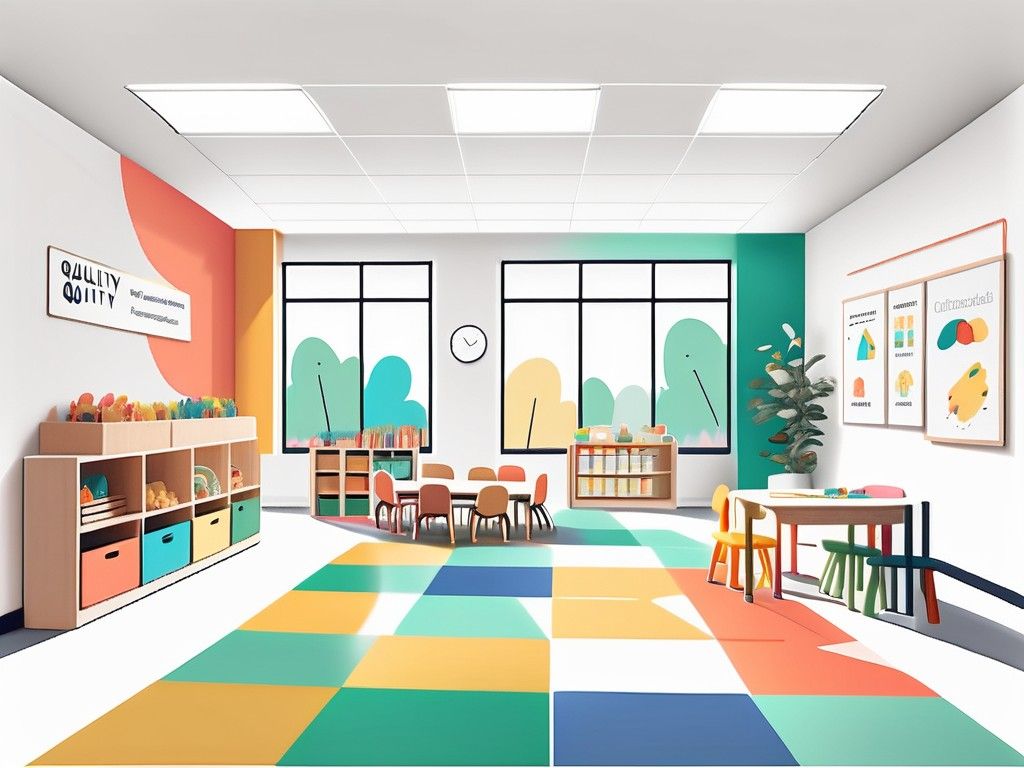In the field of childcare, the focus is often on the direct interactions between caregivers and children. However, underneath this vital component lies a crucial element that can make or break a childcare center’s success: quality administrative services. These services provide the foundation for all operational aspects of a childcare facility and play a significant role in ensuring that children receive the best possible care and education.
Understanding the Importance of Administrative Services in Childcare
The administrative side of childcare encompasses a range of responsibilities, from financial management to regulatory compliance. Without effective administrative services, even the most caring and competent staff may struggle to deliver high-quality experiences for children.

Defining Quality Administrative Services
Quality administrative services in childcare involve a set of organized practices that streamline operations, enhance productivity, and promote a culture of continuous improvement. These services should be proactive, ensuring that the center not only meets regulatory requirements but also goes beyond to offer enriching experiences for children.
This can include well-defined policies, effective communication channels, and a framework for evaluating performance and outcomes. Quality administrative services are characterized by consistency, attention to detail, and a commitment to excellence in all interactions—whether with staff, parents, or children. Furthermore, these services often incorporate technology to improve efficiency; for instance, utilizing management software can help track attendance, manage billing, and facilitate communication with parents, thereby allowing staff to dedicate more time to direct interactions with children.
Schedule a free 30-minutes session with us!
The Role of Administration in Childcare Excellence
Administration serves as the backbone of a childcare operation. Effective administration ensures that policies are not only created but also implemented effectively. Administration is responsible for creating an environment where staff can focus on what they do best: nurturing and educating children.
Good administration also plays a significant role in leadership. It fosters a positive culture that encourages teamwork, innovation, and open communication, allowing for both staff members and children to thrive. Additionally, strong administrative practices can lead to better staff retention rates, as employees feel supported and valued in their roles. Regular training sessions and professional development opportunities, organized by the administration, can empower staff to enhance their skills and adapt to new educational methodologies, ultimately benefiting the children in their care.
Key Components of Quality Administrative Services
To achieve excellence in childcare through administrative services, several key components must be addressed. Each element contributes to the overall effectiveness of the childcare operation and enhances the experiences of both children and their families.
Staff Recruitment and Training
At the heart of any childcare facility is its staff. Quality administrative services ensure that the recruitment process is thorough and considers both qualifications and the potential to connect with children. Background checks, interviews, and reference checks are all vital steps in finding the right candidates.
Furthermore, continuous training is essential. Quality administrative services will implement regular training sessions, which keep staff skills sharp and introduce new ideas and methodologies in childcare. This investment in staff not only enhances the quality of care but also contributes to staff retention and job satisfaction. Additionally, mentorship programs can be established, pairing experienced staff with newcomers to foster a supportive learning environment. This approach not only aids in skill development but also helps to cultivate a strong team dynamic, which is crucial for maintaining a positive atmosphere in the childcare setting.
Financial Management and Budgeting
Financial stability is crucial for any childcare center. Quality administrative services encompass effective financial management and budgeting practices. This includes preparing accurate budgets, managing funds wisely, and ensuring that resources are allocated effectively to support the center’s mission.
Data-driven financial planning enables childcare providers to anticipate needs, plan for growth, and maintain the quality of services without sacrificing operational integrity. Moreover, transparent financial reporting to stakeholders, including parents and staff, fosters a culture of trust and accountability. By involving the community in financial discussions, centers can also explore alternative funding sources, such as grants and partnerships, which can further enhance their financial resilience and expand their service offerings.
Regulatory Compliance and Safety Standards
Childcare centers must operate within a framework of regulations designed to protect children’s health and safety. Quality administrative services are responsible for ensuring compliance with all relevant laws and safety standards. This includes maintaining proper licenses, conducting regular inspections, and training staff on safety protocols.
By prioritizing compliance, administration builds trust with families and the community, ensuring that children thrive in a safe and healthy environment. Additionally, implementing a proactive approach to safety, such as regular emergency drills and safety audits, can significantly reduce risks. Engaging parents in safety discussions and providing them with resources on child safety can also empower families, creating a collaborative effort in maintaining a secure environment for all children. This not only enhances the center’s reputation but also reinforces the commitment to the well-being of every child in their care.
Implementing Effective Administrative Strategies
To maximize the benefits of quality administrative services, it’s crucial to implement effective strategies that promote clear communication and continuous evaluation of processes.

Communication and Collaboration Techniques
Open and effective communication channels are essential in childcare settings. Quality administrative services advocate for regular meetings, feedback sessions, and community engagement initiatives. By fostering a collaborative environment, all stakeholders—including staff, parents, and community members—can contribute to the center’s vision and operations.
Utilizing various communication platforms, such as newsletters, parent portals, and social media, can enhance engagement and keep everyone informed, ensuring that parents remain active participants in their children’s development. Additionally, hosting workshops and informational sessions can provide parents with valuable resources and insights into child development, helping them to better support their children at home. This not only strengthens the bond between the center and families but also creates a network of support that can be invaluable during challenging times.
Schedule a free 30-minutes session with us!
Technology Integration in Administration
In today’s digital age, embracing technology can significantly enhance administrative efficiency. Quality administrative services should incorporate software solutions for scheduling, billing, record-keeping, and communication. Streamlining these processes minimizes errors and saves time, allowing staff to concentrate on providing care.
Moreover, technology can facilitate better reporting and tracking of children’s development, offering valuable insights into their progress and needs. For instance, digital portfolios can be used to document children’s milestones and achievements, making it easier for educators to share this information with parents during conferences. Furthermore, leveraging data analytics can help administrators identify trends and patterns in children’s learning, enabling them to tailor educational approaches that meet the diverse needs of each child effectively.
Continuous Improvement and Evaluation
Quality administrative services are not a one-time effort but require ongoing evaluation and improvement. Regular assessments of both administrative processes and educational outcomes are essential in promoting a culture of excellence.
Feedback from staff, parents, and even children can inform necessary adjustments and foster an environment of innovation. By staying attuned to the needs of the community and industry trends, childcare centers can continually refine their practices and enhance their services. Additionally, establishing a system for tracking key performance indicators can provide a clear framework for measuring success and identifying areas for growth. This proactive approach not only helps in maintaining high standards but also encourages a sense of ownership among staff, motivating them to contribute to the center’s mission and goals actively.
The Impact of Quality Administrative Services on Childcare
When executed effectively, quality administrative services can have a profound impact on childcare outcomes, shaping not only the operation of the center but also the experiences of children and families.

Enhancing Educational Outcomes
Quality administrative services create an environment conducive to learning. When staff are adequately trained, and resources are managed efficiently, children are more likely to experience enriched educational content and interactions. This foundation supports their developmental needs across all domains—cognitive, emotional, and social.
The implementation of strategic initiatives can lead to improved outcomes such as higher readiness for school and greater overall satisfaction among families. For instance, regular assessments and feedback mechanisms can help educators tailor their teaching methods to meet the unique needs of each child, ensuring that no one is left behind. Additionally, integrating technology into the curriculum can provide children with interactive learning experiences that stimulate their curiosity and foster a love for learning.
Schedule a free 30-minutes session with us!
Promoting a Safe and Nurturing Environment
Children thrive in environments where they feel safe and nurtured. Quality administrative services prioritize safety standards, effective communication, and responsive practices, thus creating a reassuring atmosphere for both children and their families. This foundation allows children to explore and engage without leaning into fear or anxiety.
Moreover, when families feel safe and involved, trust is built, enhancing the overall community bond surrounding the childcare center. Regular workshops and family engagement events can further strengthen these ties, allowing parents to connect with educators and each other. Such initiatives not only provide valuable resources to families but also create a sense of belonging and community, which is essential for both child and family well-being.
Building Trust with Parents and Community
Quality administrative services play a vital role in building trust with parents and the broader community. By consistently demonstrating transparency, maintaining open lines of communication, and engaging families in their children’s education, childcare centers position themselves as reliable partners in child development.
Trust fosters longer-term relationships, which can have lasting positive effects for children as well as the center. Children benefit from stable relationships, which further enhance their emotional and social development. Furthermore, when parents feel confident in the administrative practices of a childcare center, they are more likely to advocate for the center within the community, leading to increased enrollment and support. This symbiotic relationship not only enhances the center’s reputation but also contributes to a collaborative environment where community resources can be leveraged to support families and children alike.
In addition, establishing partnerships with local organizations can provide families with access to additional resources, such as health services, educational workshops, and recreational activities. These collaborations not only enrich the childcare experience but also help to create a network of support that benefits everyone involved, fostering a holistic approach to child development.
